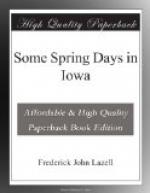* * * * *
Strange contrasts we see in some of these April flowers. Some of them open their star-like eyes for a day or two and dot the floor of the woods with beauty and then their little contribution to the spring is done and they are seen no more until another year. They bring us beauty and sweetness and then they pass from us, like the sweet and childish but perfect lives we all have known and loved. In contrast to such as these there is the Jack-in-the-pulpit of the April woods which has no floral envelope of beauty, no fragrance, no inspiration, so busy is it storing up its swollen fortunes down in the bank, leaving behind it a tuber so rank and tainted that even the Indians couldn’t eat it until they had first roasted it, then ground it into powder, and finally made it into a kind of bread. But sordid-lived accumulators, herbaceous and human, have been with us since the world began. Laban was a monopolist of pretty daughters and fine live stock,[TN-2] and Theocritus, in his day, was moved to say that “Money is monarch and Master,” and to exclaim:
Fools, what gain is a world of
wealth in your houses lying?
Wise men deem that in that
dwells not true pleasure of riches,
But to delight one’s
soul....
Only the muses grant unto
mortals a guerdon of glory;
Dead men’s wealth shall
be spent by the quick that are heirs to
their
riches.
Toward the end of the month, when the gelatinous masses in the water courses have developed the little black dots sufficiently so that we can see they are tadpoles, when the songsters have been joined by the catbird, the rose-breasted grosbeak, the woodthrush, the whippoorwill, the cheerful and friendly chewink and several of the warblers and flycatchers, the rivers and creeks will be fringed with the brilliant yellow of the marsh marigold, and we shall think of Shakespeare, walking the meadows of Avon, getting material for that song of the musicians in Cymbeline:
And winking Mary-buds begin
To ope their golden eyes.
And meanwhile the violet, which was among the plants sacred to Aphrodite, was also appealing to this master poet, who was born this month, as were Wordsworth, George Herbert, John Keble, Anthony Trollope, David Hume, and Edward Gibbon, and who died this month as did Edward Young, who wrote Night Thoughts, and Abraham Lincoln, who freed a race and saved a nation. Who can ever forget the month of Lincoln’s death after he has once read that exquisite description of an April day and the song of the hermit thrush, written by Whitman to commemorate the funeral of his friend?
The violets have been especially loved by the poets. Theocritus placed them foremost in his coronals and put them into Thyrsis’s song of Daphnis’s fatal constancy. Chaucer had them in his garlands, and Spenser’s “flock of nymphes” gather them “pallid blew” in a meadow by the river side. In Percy’s Reliques they are the “violets that first appear, by purple mantles known.” Milton allows Zephyr to find Aurora lying “on beds of violet blue.” Shakespeare places them upon Ophelia’s grave and says they are “sweeter than the lids of Juno’s eyes.” Wordsworth, Tennyson, and all our own poets have loved them.




